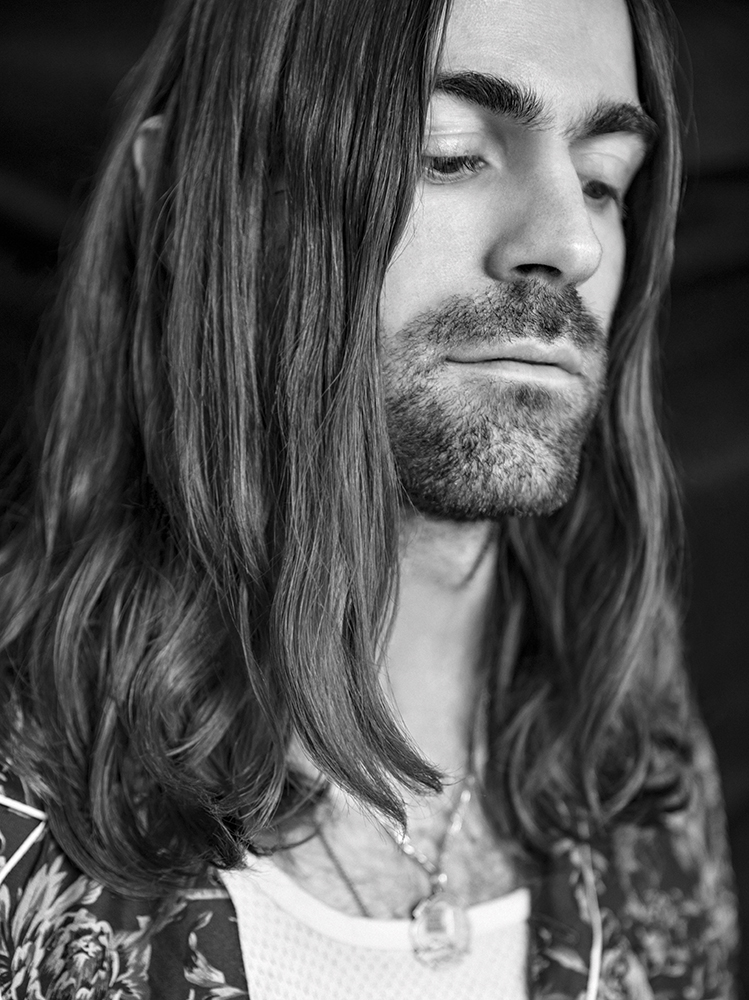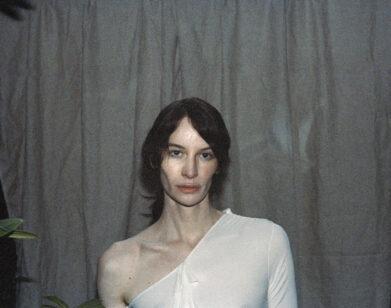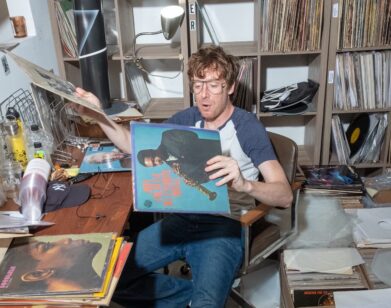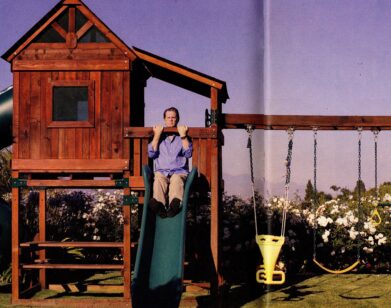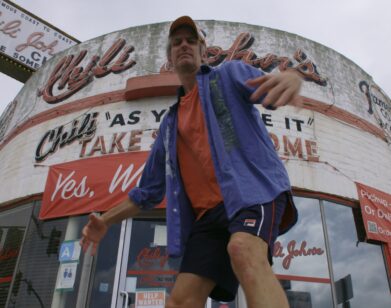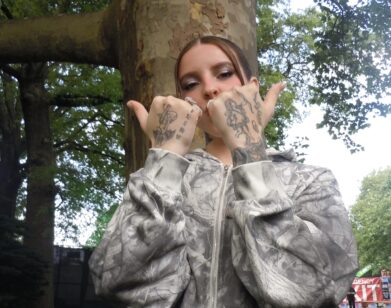Keeping the Faith
TEN FÉ IN LONDON, JANUARY 2017. PHOTOS: IAKOVOS KALAITZAKIS. STYLING: KELLY-ANN HUGHES. GROOMING: MICHAEL HARDING FOR BUMBLE AND BUMBLE.
Together, Leo Duncan and Ben Moorhouse have taken on a lofty title: Ten Fé. It translates from Spanish to “have faith,” but its significance for the London-based band isn’t tied to religion. “We’ve kept the faith,” says Duncan of their path, which began when they met at a London house party in 2005. Moorhouse, 30, and Duncan, 31, spent years playing music together solely for the love of it, but when they started working on their own material (which they both write and sing) it became an earnest pursuit. They landed a manager and publishing deal, and found themselves busking to fund a trip to Berlin, where they recorded their debut record with Ewan Pearson in 2015. Titled Hit the Light (Some Kinda Love), the emotive electro-rock LP was released last week, and now Ten Fé is readying for the road.
“The most exciting thing I think for both of us is going out and playing it with the band, because we’ve got a band of close mates who are going to go on the road with us, and actually getting these songs out to people live,” says Duncan by phone from London. We’re pleased to announce that this summer, they’ll perform their first stateside shows, beginning with a stop at New York’s Mercury Lounge on June 6. “We’re going to Bonnaroo, which is amazing, and New York, L.A., San Fran—all of these exotic, mythical places we cannot wait to play,” Duncan continues with a laugh. “We’ve got a lot of love for the album, and we’re lucky enough that there are people who want us to come and play it to them.”
HALEY WEISS: I’d like to hear about how you guys met. I read that it was at a house party.
LEO DUNCAN: Yeah, that’s true. [laughs] We had mutual friends, [I’m] from Birmingham, and a load of people I was in bands with all came down to London at the same time and started bands with people Ben was mates with in London. So we had these massive jam sessions together, everyone playing together. We kind of met playing together even though we didn’t know each other.
WEISS: What attracted you to each other as musicians? What made you decide to form a project together?
BEN MOORHOUSE: At that party we were the only two people who liked playing rock ‘n’ roll songs. We had a lot of friends, who we both knew, who were trained musicians and they were a little bit snooty about some songs, so when Leo and I got up we just started playing an Elvis song. That definitely started something that we then took further by meeting up more, playing lots of songs, and singing.
DUNCAN: Yeah, and liking the same music, like all of those old rock ‘n’ roll songs, Little Richard, and the Stones—who’ve just come on in the coffee shop [we’re in]. [laughs]
WEISS: When did you decide to move to Berlin to make the album?
DUNCAN: Pretty much as soon as [producer] Ewan Pearson said that he wanted to make it with us. We signed the publishing deal, so we knew we had enough money to pay him, we just needed to find the money to keep ourselves whilst we were over there, so we hit the trains hard. We were busking for a long time, for a few months solid, just to save the money. Once we knew we wanted to do it, and had the money, we were on the first flight.
WEISS: When you were busking were you playing your music or other songs?
DUNCAN: We needed to make a lot of money, so there’s no point in playing our songs. We played exactly the songs that Ben was talking about, like rock ‘n’ roll songs—the Stones and the Beatles. The vocal harmony—to go back to your other question as well—just singing together, I think we noticed our voices go well together. You have to sing together on the Tube because it’s too loud for one person to sing on their own.
WEISS: What was the most interesting reaction someone had to one of your busking performances?
MOORHOUSE: There were all sorts, really, like really good responses, and really sort of violent responses, and really angry. [laughs] We’ve been head-butted and punched.
DUNCAN: They’re exceptions; usually people are very generous.
WEISS: Why do you think you were head-butted? Was it revealed to you?
DUNCAN: They obviously didn’t like Bruce Springsteen as much as we did.
WEISS: What made you want to work with Ewan Pearson other than him being interested?
MOORHOUSE: In the songs we were writing, we’ve obviously got a live, rock ‘n’ roll side to it, but we also use electronics, and could see the potential for a producer to bring that dance-y element to the music, kind of like on Primal Scream’s Screamadelica, the way they wrote with Andy Wethearall. That was something we had in mind, that kind of role that that person would take, and Ewan seemed like the perfect guy to do that.
WEISS: How long after you two came together were you taking music seriously, in the sense of trying to put an album together or get a publishing deal?
DUNCAN: Quite a long time, actually. We’d been hanging out and busking together, just loving playing music together, for a number of years. It actually happened that we were in different bands and then the band I was in invited Ben to join, and very soon after that Ben and I realized that the songs we were writing were too good for that band, so we started really, in earnest then—I guess that was about four years ago—deciding to take this seriously. We then started playing songs to each other, which we’d never done before, and that was a big revelation. I think we both realized then that there was something really special going on. It wasn’t long before we kind of dropped the other people in the band and got our acts together to make a few demos. That’s how we got management, and then it all started properly. But I think it’s interesting that there’s a long time before we even got playing our songs to each other, let alone the industry or management. We were just playing together for the fun of it and busking for money. I think the relationship is built on quite a solid foundation because of that.
WEISS: One of the themes on this album is going from darkness to light. Can you talk about putting together this collection of songs, thematically, what you were thinking about?
DUNCAN: That wasn’t something we consciously did. When we started writing together we’d go off just the pair of us, and isolate ourselves from London up in the Midlands where my dad lives, and write, really, without any sort of an album or anything else. We then realized that certain themes were emerging; in most of the songs there’s a theme of renewal, getting through hardship, and beginning again. It seemed to come naturally. You could guess about a load of personal things going on in our lives, why that was, but that’s what it meant. I think we’re both just happy other people can hear that; if that comes across, then that’s a really important thing.
WEISS: Beyond playing it for your producer and with each other, is there someone you played the album for first, whose opinion you wanted on what you were making?
DUNCAN: We’re very close to our management, Some Kinda Love, which is also the label we started together. They’re incredible; they supported us right from the very start. We’ve got a lot of respect for how they hear it. It allows for us not to be A&R’ed. It’s a very tight little circle of people we trust the opinions of, so our management would be a big thing, and the guys in the band that we play with—Johnny [Drain] and Rob [Shipley]—as soon as we’d finished stuff we’d play it to them, or they’d hear it sooner or later. So not many people, really our mates, who are our manager and the people we’re in the band with.
WEISS: What do you value most in a collaborator? Is it someone who will be very blunt, or do you want someone who’s going to affirm what you’re thinking?
MOORHOUSE: I think obviously, the love for it, that’s pretty crucial. It soon becomes quite obvious when people you’re working with aren’t really—their head is not in it, or their heart is not in it, for whatever reason. That’s definitely a big part of it. At the same time, with people we work with, it’s quite open and there’s plenty of room for people to say what they feel about stuff, whether they like things or not, whether they think things should be better. Every person we work with closely in the band has input into it and can say, “This isn’t working.”
DUNCAN: And when it comes to collaboration, it’s collaboration all over the place. Obviously the center of the group is between Ben and me, and I think the key to that relationship is trust and a lack of ego—it really is. To collaborate properly, you have to dissolve your ego, and that’s a process that takes time for any artist. And that’s why I feel we’re both vibing off of this album and this band, because we’ve found someone we can do that with. You can’t be saying, “Well, I think you should turn my guitar up here,” or, “Maybe you should add an extra verse of my lyrics here.” As Ben says, it’s clear when someone’s still operating on an egotistical level. I think we’re well-developed enough in the creative process to see where that’s happening and ward each other off when that does happen. But I think we’ve got to a place now where we can naturally come at it in a way that we’re thinking about the best for the song, the best for the band. Which, having played with dozens and dozens of musicians personally, no one does that like Ben does it for me, so that’s probably why we’re attracted to each other: it’s lack of ego between each other and a real determination to get the song as good as it can be.
HIT THE LIGHT (SOME KINDA LOVE) IS OUT NOW. FOR TOUR DATES AND MORE ON TEN FÉ, VISIT THEIR FACEBOOK.

